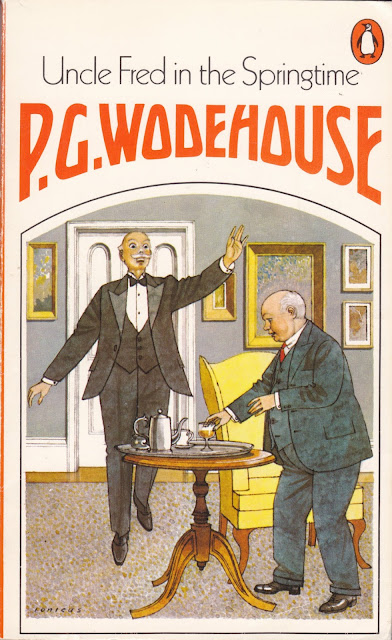If it were the cover of a Victorian penny dreadful, it would have the simple yet dramatic caption: "Mustard! Stop!" Even without knowing this, it is easy enough to see that Uncle Fred is trying to warn his old friend "Mustard" Pott not to drink the brandy, being, as it is, spiked with a knock-out drop. Uncle Fred has something of a military bearing, but is unmistakable. Mustard does not perhaps have all he might have of the Silver Ring Bookie about him, but that is mere splitting straws. This cover probably dates from 1972, to judge by the reprint dates, and it is vintage Ionicus, from the interior details (Blandings seems to favour paintings of the Impressionistic school in the Garden Suite; even the carpet is Pointillist) to the dapper correctness of the figures and the typical choice of a moment of drama from very late in the plot.
Here is the opening paragraph, set in Monotype Garamond, typical of the Wodehouses first published in Penguin in the 1950s (this was Penguin-published in 1954):
It is wonderful how, without having described anything very much, Wodehouse has drawn the reader in and made the said reader want to know more.
Having reread Uncle Fred in the Springtime a couple of weeks ago, I have been reminded how superbly it is written, especially in the first half. (In my opinion, there are slightly too many complications in the second half; but it is of course still wonderful.) There is in this book that carefree pre-War feeling which, perhaps, he was never quite able to touch again.
If I were to set down a few words about Uncle Fred, I would say just this. I love him as a character, and he is very funny, but I am very glad he is not my uncle. I always sympathise very much with his nephew Pongo in this respect.
I tend to think of Uncle Fred as a more or less constant visitor to Blandings, but on checking my facts I find that he only made two excursions to that balmy locale, the second in Service with a Smile (1961).
Here I must confess to some embarrassment. I used to have this copy, and I was convinced I still did. I hunted all round for it. But, at last, I have had to come to the conclusion that I must have sold it on - though not before taking a scan of the cover. As far as I can tell, it was first published in Penguin in 1966 and the Ionicus cover seems to date from about 1975. As I foolishly did not scan the reverse of the title page or the first page of the text there is nothing more I can tell you about the edition.
Wodehouse's novel itself is from that uncomfortable transition period in his late oeuvre when his imagination seemed to sag and he was attempting to recreate earlier glories, succeeding only in pale imitations. The prose always remained limpid and perfectly balanced, but somehow the zest was gone. In my opinion some of the still later books, from the mid-1960s onwards, found a new, relaxed style, with simpler plots and less straining for effect. These, then, are some of my excuses for not having kept hold of this particular book, which has such a wonderful cover. Another reason is that I was convinced I had already "done" it for the blog.
Here is our only sighting of the station of Market Blandings in the Ionicus portfolio. We are in a rural backwater, but there is still activity, and the porter has an excellent moustache. The character studies of Uncle Fred, Lord Emsworth and (if I mistake not) American tycoon James Schoonmaker are in every respect perfect. What all those parcels and crates are doing strewn negligently about the platform is more than I can say, but perhaps it is merely artistic licence.



No comments:
Post a Comment